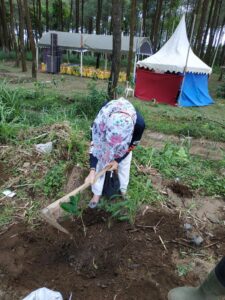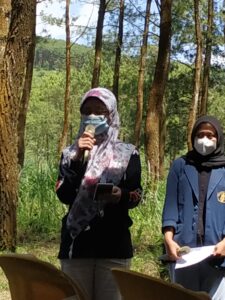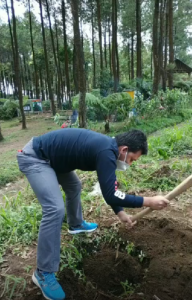


On November 5 2022, the Service Team of the Faculty of Administrative Sciences, Universitas Brawijaya (FIA UB) carried out an innovative and sustainable community service program in Babadan Village, Ngajum District, Malang Regency. This program collaborates with the Forest Village Community Institute (LMDH) Maduarjo hamlet and the Malang Regency Forestry Service, and involves FIA UB students. The main focus of this activity is planting coffee seedlings in the village demonstration garden, which also becomes a symbol of the start of a model for sustainable coffee plant care in the area.
This activity begins with planting coffee seedlings in a demonstration garden provided by the village. This demonstration garden not only functions as a place to grow coffee, but also as a means of education and training for village communities regarding correct and sustainable coffee plant care techniques. Through this demonstration garden, the community can learn directly about the best practices in coffee farming, from planting to harvest.
The program includes a variety of activities designed to ensure long-term sustainability and success. One important aspect of this program is the planting of other production trees besides coffee, such as fruit or wood trees, which have high economic and ecological value. The goal is to create agroforestry that not only increases coffee production but also maintains the balance of the forest ecosystem.
The FIA UB Service Team together with LMDH Maduarjo and the Malang Regency Forestry Service are committed to providing sustainable assistance to village communities. This assistance covers the entire process, from planting, care, harvesting, post-harvest, crop production, to sales. In this way, the community is not only given basic knowledge, but also the practical skills needed to manage coffee farming independently and sustainably.
During the planting stage, the service team provides intensive training on good and correct planting techniques, including how to choose superior seeds, planting techniques that suit local soil conditions, and how to care for coffee plants so they grow healthy and productive. Apart from that, the community is also given knowledge about environmentally friendly pest and disease control techniques, so that the coffee farming that is developed is truly sustainable and does not damage the environment.
Assistance does not stop at the planting stage. The service team will continue to accompany the community until the harvest stage, ensuring that each stage is carried out well and in accordance with established standards. After harvest, the community will also be given training on the coffee production process, including how to process the coffee beans until they are ready for sale. This process includes fermentation techniques, drying and grinding coffee beans, so that people can produce high quality coffee products that have good selling value on the market.
Furthermore, this program also includes training on marketing and selling coffee. The public is taught how to package their coffee products well and attractively, as well as how to market these products both locally and nationally. In this way, it is hoped that the community can be independent in managing their coffee farming and improve the economic welfare of their families.
The hope of this program is to create a sustainable coffee farming model and provide significant economic benefits for the Babadan Village community. With assistance in the production and sales process, it is hoped that the community can be independent in managing their coffee farming and improve the economic welfare of their families. Apart from that, it is also hoped that this activity can become an example for other villages in developing their local potential in a sustainable manner. With the success of this program, it is hoped that a sustainable coffee farming model can be created that can be replicated in other areas, so that more people can experience the benefits.
Brawijaya University: Serving the Nation
With the spirit of service, Brawijaya University through various community service programs continues to strive to make a real contribution to the development and welfare of society. This activity of planting coffee seedlings in Babadan Village is a concrete form of this commitment.
Service Team, Faculty of Administrative Sciences, Brawijaya University

